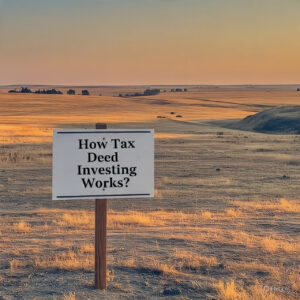Thinking About Texas Tax Deeds? Here’s How It Works (And Why It’s Catching On)

Ever wondered what it’d be like to own real estate for pennies on the dollar without being a landlord or flipping houses? That’s the world of tax deed investing, and it’s growing fast, especially in Texas.
If you’ve heard of tax deeds but still aren’t totally clear on how it all works (or how you can get involved without going to auctions yourself), this article is for you.
We’ll break it down step-by-step, and show you how everyday investors, not just insiders, are getting in through a crowdfunding model that’s designed to be hands-off.
What Exactly Is a Tax Deed?
When someone doesn’t pay their property taxes in Texas, the county eventually steps in and sells that property at auction to recover the debt. That’s called a tax deed sale and whoever buys it gets ownership of the property.
Unlike tax liens (which just give you a claim to the debt), tax deeds give you actual title to the land or building.
Why Texas? What Makes It Different?
Texas has some of the strongest investor protections in the country when it comes to tax deeds:
- Fixed redemption returns: If the old owner wants the property back, they must pay you 25%–50% more than you paid.
- Monthly deal flow: Auctions happen every month in all 254 counties.
- Bidding based on value: You can win properties for a fraction of the market price.
The best part? That redemption return is required by law even if the property is redeemed the very next week.
Wait, So How Do You Actually Invest?
Here’s how the process works when you’re investing passively (like with CORE Tax Deeds):
- The fund identifies opportunities across counties
- Due diligence happens – title checks, property visits, inspections
- Auctions are attended, and properties are acquired
- If the property is redeemed, the fund earns 25% or 50%
- If not, the property is sold, rented, or held — and you benefit from the proceeds
You don’t need to know real estate, go to courthouse steps, or manage tenants. It’s truly passive.
What Kind of Properties Are We Talking About?
CORE’s portfolio includes:
- Single-family homes
- Small land parcels
- Commercial infill lots
- Even acreage with mineral rights (rare, but real)
Each one is vetted and assessed before bidding. The team only moves when the deal is right.
The Legal Side: Reg CF Makes It Accessible
This model works because CORE Tax Deeds uses Regulation Crowdfunding (Reg CF) — a legal structure that opens up private deals to everyday investors.
That means:
- You don’t have to be accredited
- You can invest from retirement accounts (check with your custodian)
- You get regular updates on fund performance
Texas tax deeds are no longer a secret. And with a fund doing the heavy lifting — vetting, bidding, managing — it’s now realistic for passive investors to take part.
If you want a real asset, backed by real law, with returns that don’t depend on the stock market… this could be worth exploring.
